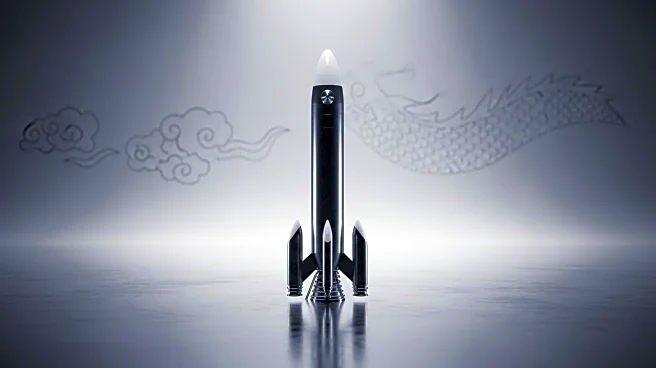What's Happening?
Kim Jong Un has overseen a test of North Korea's new high-thrust rocket engine, which is expected to power the country's latest intercontinental ballistic missile (ICBM), the Hwasong-20. This test follows Kim's visit to Beijing, where he attended a military parade alongside Chinese President Xi Jinping and Russian President Vladimir Putin. The test marks the ninth and final trial of the solid-fueled engine, which is made with carbon-fiber composite materials. Solid-fueled rockets offer greater stability and can be launched more quickly than liquid-fueled missiles, making them harder to detect. The successful test is seen as a significant step in expanding North Korea's nuclear strategic forces.
Why It's Important?
The timing of the rocket engine test, shortly after Kim's visit to China, suggests a bolstered confidence in pursuing North Korea's nuclear weapons program. The strengthened ties with China and Russia may provide North Korea with increased political and economic support, potentially reducing the impact of international sanctions. The omission of denuclearization discussions during Kim's meeting with Xi raises concerns about China's acceptance of North Korea's nuclear status, which could alter regional security dynamics and challenge U.S. diplomatic efforts.
What's Next?
North Korea's advancements in missile technology may prompt the United States and its allies to reconsider their security strategies in the region. The deepening ties between North Korea, China, and Russia could lead to shifts in geopolitical alliances, affecting future negotiations and international relations. The U.S. may need to engage in diplomatic efforts to address the evolving security landscape and mitigate potential threats.
Beyond the Headlines
The evolving relationship between North Korea, China, and Russia highlights the complexities of international diplomacy and the challenges of addressing nuclear proliferation. These alliances may influence global power dynamics and impact efforts to maintain regional stability. The potential acceptance of North Korea's nuclear status by China could have long-term implications for international security and diplomatic strategies.










